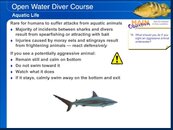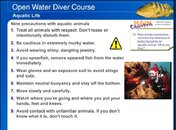I've had a fair amount of experience diving with sharks in open and confined water, both in a cage and non-cage dives, with a variety of sharks raning from Great Whites, Tiger, Blue, Mako, Brown, Sandtiger to Nurse/Grey sharks.
I also spent nearly everyday for 4 years in the water with sharks at an Aquarium and ran two of the shark dive programs for the public. I do not have a biology degree and my opinion is based on experience and what I've read.
Here is my OPINION based on that experience.
1) I do not believe in the "Mistaken Identity" theory.
Science has always put forth and maintained that shark attacks are because they believe "we" are a mistaken food source - specifically seals for the most part. Scientists have also proclaimed how very, very sensitive a shark is to the sense of smell (blood), vibrations and to varying degrees, electromagnetic "signatures". Every living thing gives off some kind of bioelectrical "signature", I don't believe anyone, even a scientist, would argue this point.
If everything above is true then there is no way possible a person in the water "looks" like a seal. If you compound this with Scuba divers wearing any kind of neoprene or local surfers wearing a body suit it makes even less sense.
2) Sharks are wild and hunt for food
Even diving in an aquarium where the sharks were well fed the sharks DID hunt on rare occassions. Yes, diving in this environment almost ensures that I would never be looked at as a meal, but they did hunt fish. I spent a great deal of time snorkeling on the surface with these aquarium sharks and diving with them. I've accidentally jumped on them, kicked them, surfaced into them underneath, been with them in pitch darkness, came around a corner and bumped into them face-to-face and I'm still here.
In open water it's a bit different. They are wild animals, you don't know when they last ate no different than any other wild animal. There's always a chance that you could run into a shark "on the hunt", no different than running into any other wild animal on the hunt anywhere.
3) Be Smart
I personally feel diving with sharks and putting food in the water is nothing short of pathetically stupid - if you're not in a cage. These open water shark dives where they take a group of divers, kneel on the bottom, and start handing out food to small reef sharks is extremely dangerous and it's only a matter of time before someone get's "tasted". Put me in a cage and fine, otherwise, it's just not a chance I'm willing to accept.
The point another person made about "don't act like food" is true as well. Diving with sharks in open water isn't that bad, for the most part every person on here is correct, they leave the area or at best make a pass to check you out and then leave. Snorkeling with sharks in open water, completely different, especially with certain spieces that use an upward attack angle. Once again, why take the risk? Being on the surface for an extended period of time snorkeling in known areas where there are aggressive spieces such as a Bull, Tiger, White and other's is like playing the lottery where you're the prize; a great meal.
3) Shark Attack File
Go read. Shark attacks are rare, and extremely rare for divers. We basically sound like Darth Vader under water - flat out not a natural food source. Once you read a couple hundred past and present descriptions on encounters you begin to see a pattern. Form your own educated and informed opinion, read the facts and ignore the opinions so to speak.
Attacks are usually broken down by two status's; provoked and unprovoked. Take for example Nurse Sharks. In almost 100% of cases nurse sharks are provoked and in almost 100% of the cases, by divers. Nurse sharks are very docile, typically lay on the bottom and will let you get up kind of close for some great pictures. Because of that and because of some of the shark feedings, like the one in FL, people get a false sense of security and pet them, kiss them (like the idiot in FL did), crowd them, etc... Guess what happens? It doesn't take a rocket scientist to tell you, you're asking to get bit, and they do.
After reading several hundred shark attack files I've formed my own "groupings" as to why attacks happen. MY THEORY makes two assumption's though - 1) All attacks occur because they were hungry and you were there. 2) Shark bites are extremely damaging to our soft human bodies, massive damage with a single bite which often leads to death. It's that simple.
Group 1 - Crowd attacks:
Fairly simple. All the vacationers at the beach and swimming in the water, spalshing around, just having a ton of fun. Shark is out on the hunt, looking for food, someone get's bit/attacked/hit (whatever you want to call it) and all "hell" breaks loose with people screaming and leaving the water. The shark is scared away. The person lives or dies depending on the severity of the bite.
Group 2 - Local Surfers, Bodysurfers, etc..:
Locals who spend a lot of time in the water understand how the body loses it's heat in water. If you can recall from your basic class you lose your body heat 25x faster in water than air. The local surfers know this, they wear neoprene either in the form of a shorty or full suit to stay warm. Shark is on the hunt, comes up to eat/bite/check out (whatever you want to call it), they get a mouth full of surfboard or rubber and - YUK! - shark says it tastes nasty and off they go to find some "real" food. The person lives or dies based on the severity of the bite.
Group 3 - Isolated small groups or individuals:
A couple people jumping off a sailboat in a pretty little cove, a person wonders way, way out to a set of sandbars another 50yds from the main beach line, the sole surfer who wants a quick wave or two and doesn't wear the rubber suit, etc....you get the idea. Shark comes by on the hunt, etc...and guess what...in nearly every case that falls into this category the person is eaten. Not attacked and the shark swims off because we weren't a seal, no mistaken idenity here, shark is hungry, you're alone, no rubber to taste bad, no group of screaming people to scare it off, they get eaten.
Teaching about sharks in a basic class I believe is important but to the extent of the content and how much time an Instructor spends the limited time he/she has can be debated. I spend probably 10 minutes on sharks. It goes like this...
1) Sharks are wild animals. Just like any other animal you run into if you leave it alone, for the most part it will leave you alone.
2) Why the heck would you do anything to provoke it? (See #1) Spearfish, pet, kiss, crowd, startle, etc...a wild animal, much less a shark? Just stupid if you ask me.
3) Sharks in the majority of the time leave the area before you ever see them.
4) If you get to see a shark consider youself lucky (see #3).
5) Be aware of your surroundings and behavior of the shark and type of shark. This doesn't take an expert. Are they feeding? Are they mixing speeds, slow/fast? Are you in the water with one of the 3 very aggressive spieces? Are you doing anything to provoke, startle it? Is the shark taking more than a common interest in you, just one or two 'fly by's' so to speak.
6) Avoid known hunting areas. Um...yea, lets go diving in South Africa off Seal Island during the Seals Breeding cycle (sharks do migrate for this)....yea, umm...thats smart.
7) If you're uncomforable or scared go to the bottom, kneel down and find a spot where you can take away some of your exposure. Put your back against a reef to take some of the 360 degree enviroment you're in.
Bottom line is this: I'm still here. You will be too if you take some common sense approaches to sharks no different than you would to any other wild animal. Would you run up to a cute, cuddly grizzly bear and try to pet it? Then why would you, or anyone else, want to do it with a shark?
All of this is MY OPINION. I am not a marine biologist. I've done a ton of dives and reading on sharks and formed my own opinion. I hope I don't catch a lot of "grief" from the science group over this, but it won't be the last I'm sure.



 Anyway, prior to diving, she still had a very deep seated fear and will still flinch when she sees them on TV. She too has seen all the sharks I have diving and while she won't try to chase them down to take a picture, she is pretty at ease as she's seen first hand, they could really care less about us.
Anyway, prior to diving, she still had a very deep seated fear and will still flinch when she sees them on TV. She too has seen all the sharks I have diving and while she won't try to chase them down to take a picture, she is pretty at ease as she's seen first hand, they could really care less about us.

